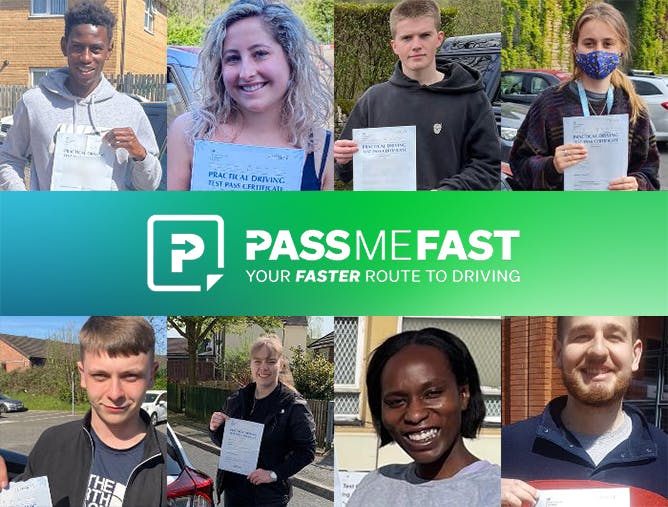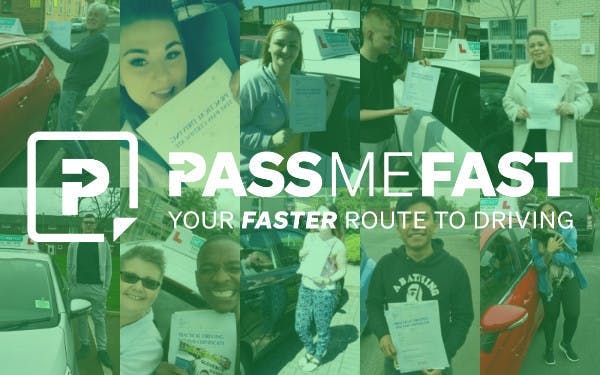
Looking for student discount? Get your coupon code for a sweet 5% off any PassMeFast course.
Every September brings the beginning of a new term. Sometimes it can feel almost more New Year-ish than New Year. We did a bit of research, and alongside your studies, most of you wanted to harness those good intentions to develop your ‘soft skills’ too. Things like learning to drive, which will put you in good stead for the future.
But while the majority of students want to take driving lessons and get their pink licence, not everyone has taken the plunge. Those of you on the fence identified four main factors putting you off learning to drive: cost, nerves, feeling too busy, and not seeing the need right now.
We’re keen to make driving a realistic option for everyone who wants to learn—so here are the ways we can help you overcome these challenges, and get you on the roads.
The problem: Cost of driving

Now, obviously, learning to drive is always going to be a long-term investment. But that thought isn’t always enough to sweeten the blow to your wallet—so we’ve done what we can to help make lessons more affordable.
✓ First off, you can get 5% off any of our driving courses with a valid student card or email address. Just let us know you're a student when you book in, and we’ll apply your discount.
✓ Next, we only ask for a £150 deposit. That gets you into the system so we can start finding you a fast-tracked test and matching you with a suitable instructor. Your final balance is only due once everything's set up, so the earlier you book in, the more time you have to save up.
✓ Finally, you can use finance to get you on the roads. In order to make driving lessons more accessible to everyone, including wannabe student drivers, you can now choose to spread the cost of your lessons over a whole year. Just choose Payl8r or Klarna at checkout, and you’ll be able to pay off your balance in smaller amounts through monthly instalments.
Remember, with credit options, always be mindful of interest charges. Payl8r will conduct a credit check to see whether you’re eligible for finance.
The problem: You don’t have time to take student driving lessons

It’s annoying when people assume you’ve got tonnes of free time, just because you’re a student. We know all about long reading lists and seminar prep, just as we know that contact hours vary massively between courses. And, among the studying, there are also sports, social events, placements and part-time jobs to fit in. It’s a lot!
So it’s understandable that many of you feel like you don’t have time for driving lessons as well. Especially since, before PassMeFast and intensive courses came onto the scene, the learning-to-drive process was a pretty lengthy one.
The solution: A flexible, semi-intensive course
These days, there’s a much more efficient option: totally flexible, semi-intensive driving courses. Devote just a few hours a week to driving, slotting your lessons in around your course and other activities, and you can master the skills needed to pass your practical test within a matter of weeks.
We always book your practical test first, so you’ve got a clear goal to aim for. Once you’ve confirmed the date, you can work with an instructor to come up with a schedule of regular lessons (we recommend at least two a week) that suits you. Ultimately, this structure saves you time by helping you progress quickly, without compromising on experience. That means you only have to commit to learning during one semester, rather than have lessons dragging on for the whole year.
The problem: Nerves

Nearly 10% of you stated nerves as your primary reason for putting off learning to drive. It can definitely feel intimidating getting behind the wheel for the first time, and the more you build it up in your mind, the more insurmountable it can seem.
The solution: Get properly prepared
Like with many new skills, for most people, those anxious feelings go with time. But in order to give yourself the best chance of reducing your nerves, you should start swotting up on your driving theory.
One mistake many learners make is treating the theory test like it’s the practical test’s annoying little cousin. Instead, see it as the important foundation for your driving lessons. You’re expected to have a thorough understanding of the rules of the road—and once you know what you’re meant to be doing, the thought of actually doing it becomes a whole lot less daunting. We have a whole range of guides on how to tackle your theory: start with this introduction to the theory test topics, and go from there.
If you’re still feeling anxious once you start your lessons, take a look at these top tips to turn you into a confident driver.
The (not yet) problem: Driving doesn't seem a priority right now

A few of you said that you didn’t need to be able to drive right now because you live on campus, or in a city where you have easy access to places and public transport. And, with all the obvious benefits to both you and the environment, we fully advocate walking, rolling or cycling where you can.
Obviously, that’s not a problem now, not at all. But we also know that it might become so in the not-too-distant future: not having a driving licence can really limit your options in terms of jobs, housing and spontaneity. We're also aware that, just at the time you really need to be able to drive, you might not have the time, flexibility or finances to be able to.
The solution: Keep it a non-issue by learning to drive as a student

Get ahead of the curve and learn to drive before it becomes a problem. Once you’re looking for gainful employment, the last thing you want is to be constrained by high rent prices close to your workplace, or a long commute on poor public transport from a more affordable area. Having your licence ready to call into action gives you broader opportunities at a moment’s notice.
The beauty of learning to drive as a student before you really need to is that you can often wait to buy a car. This splits your costs between driving lessons and the bigger commitment of owning a vehicle—which includes not only the initial outlay but also fuel, tax, insurance, garage bills and parking costs.
Learning to drive as a student FAQs
① How long is there between booking in and getting going on the roads?
If you want to take student driving lessons this academic year, the best thing you can do is book in ASAP. The reality is that, while we do everything we can to secure you a practical test quickly, we’re up against it at the moment, what with the post-restrictions backlog. Don’t despair, though: waiting lists might be long—but everybody in the queue will get to the front.
② How many lessons does it take to learn to drive?
The DVLA says it takes an average of 45 hours to learn to drive and gain enough experience to be deemed competent. This takes into account a whole range of learners, some of whom struggle with spatial awareness or anxiety. You can speed up the process by taking frequent lessons and committing to learning your theory inside out.
③ Do you have driving instructors near me?
We have top driving instructors across the whole of the UK, so wherever you’re based, we will be sure to find you a great match. They can pick you up from uni, school, college, work or home so you can fit more lesson time into your schedule.
Subscribe for driving advice, offers & more
We'd love to let you know about our courses, news and offers via email. You may unsubscribe at any time.
Star Genie Limited trading as PassMeFast. Company number 10093359
Copyright © 2024 owned by Star Genie Limited
PassMeFast, Blue Tower, MediaCityUK, Salford, M50 2ST

